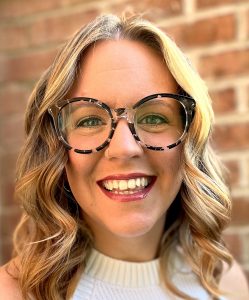I’m not usually the person who walks around every day wearing Pride merchandise. In fact, I tend to wear all black clothing the majority of the time, a holdover from the “emo kid” fashion influence of my teens.
So standing at the full length mirror in my hotel room on the first morning of CBF General Assembly, I was surprised to be asking myself, “Am I wearing too many rainbows?”
Shortly after my 30th birthday, I said the scary words to another person for the first time: I think I might be gay.

Val Fisk
The next couple of years were a slow process of coming out, both to myself and others, culminating in sharing my sexual identity with my congregation on Pentecost Sunday in 2022. Coming out in my thirties has offered the relief of knowing self-discovery never will end. I always will be uncovering and accepting new facets of myself as I grow and learn about who God is calling me to become.
Until last month, I never had considered myself someone with intersecting social identities. As a cisgender white woman, I move through the world with a lot of privilege. Many of the systems in this world are designed for me to be generally successful.
As I have processed the blatant acts of patriarchy and discrimination displayed by the Southern Baptist Convention this summer, I have come face to face with the reality that I do have intersecting social identities to consider, which create compounding and intertwined experiences of discrimination and hurt. There are particular challenges I face as a queer woman who is called and ordained to ministry in the Baptist tradition, which straight allies to the queer community do not face.
Our days at General Assembly reminded me that the CBF is still uncovering and accepting new facets of our fellowship as we learn about who God is calling us to become.
Finding a ministry job as a woman in Baptist life is hard enough as it is. Churches that claim to be supportive of female ministers have a whole list of reasons why their congregation “just isn’t ready for a female senior pastor yet.” We answer questions from search committees that our male colleagues are never asked, such as if and when we might have children.
Each and every time we step behind a pulpit, we feel the pressure to be excellent — no, extraordinary — because we fear someone might use our less-than-excellent day as an example for why women shouldn’t be pastors. We are constantly putting up with the patronizing behavior of older male congregants who call us “sweetheart” and hug us with their hand a little too low on our backs instead of discussing the sermon we spent all week preparing.
“And now I’m throwing ‘lesbian’ into this already messy intersection of my Baptist and female identities?”
And now I’m throwing “lesbian” into this already messy intersection of my Baptist and female identities? Crank that internalized pressure switch up to 11. Suddenly, I forget to focus on all the other wonderful things about myself and my work as a minister. I forget to celebrate myself in other ways, because the loud and angry voices of the world are so focused on this part of me. I become defensive and nervous, focusing on proving myself to people I will never even meet. Suddenly, I’m looking in the mirror in my hotel room wondering if I’m wearing too many rainbows at once.
I am incredibly grateful the church where I serve now is full of people who support, love and celebrate my overlapping identities and experiences. But the Baptist world is not set up for queer women to thrive. How can we flourish when we are so often trying to defend our own existence?
During the Baptist Women in Ministry dinner at General Assembly, BWIM Executive Director Meredith Stone cast a vision for what transforming power and authority in the church will look like: “As we push closer to transformed power, we will see a world in which women in ministry are wanted, not just permitted. A world in which women in ministry are celebrated, not just tolerated. We want to see a Baptist world in which women in ministry thrive, not just survive.”
Later at the same event, CBF’s director of ministerial transitions and abuse prevention and response advocate, Jay Kieve, commented on the same idea of thriving in ministry: “Women should not have to be more resilient and overcome more harm in order to respond to the call of God in their lives.”
“I want to see a Baptist world in which queer ministers thrive, not just survive.”
I was struck in those moments of profound vision casting that we could easily remove the word “women” and replace it with “LGBTQ people.” We want a world in which LGBTQ people in ministry are celebrated, not just tolerated. I want to see a Baptist world in which queer ministers thrive, not just survive.
Much like the female-affirming churches that are not quite ready to hire a female senior pastor, there are now LGBTQ-affirming churches that are not quite ready to hire an LGBTQ pastor. As a result, I think less about what I will achieve, lead or create in my ministry, focusing instead on how to make myself as inoffensive as possible, so that a church might want to hire me.
When I consider my future in ministry, I am worrying about the if, when and how of introducing my congregation to a woman I’m dating. I wonder whether the health insurance plan a church provides will cover the particularities of conceiving as a queer couple and how to handle the inevitable invasive questions about that process if and when I choose to have children.
When I consider my future in ministry, I constantly weigh the pros and cons of being the poster child for all LGBTQ people. What kind of mental health toll am I willing to take on myself by being the first openly queer person to fill a role? I’ve only been publicly out of the closet for one year, but I have to be the perfect queer female minister, representing all LGBTQ people who will ever attempt to be ministers.
Three years ago, when my best friend came out publicly, I told him, “It’s not even the most interesting thing about you.” Then I cross-stitched those words around a Pride flag for him. I stand by that truth. His queer identity is not the most interesting thing about him. My queer identity is not the most interesting thing about me.
“No one’s sexual identity is the most interesting thing about them.”
No one’s sexual identity is the most interesting thing about them. And yet so many congregations, church leaders, denominations and individuals in the pews have boiled our identities down to just our sexuality as a reason someone should or should not be a minister.
I am a pastor. I am qualified, educated, trained, ordained by my congregation and, most importantly, I already am doing this work. I am also a hiker, a friend, a daughter, a sister. I am an auntie, an adventure seeker, a taco enthusiast, a coffee snob. I have a slight allergy to wheat, but I love bagels too much to give them up. I devour romance novels faster than the banana pudding at a potluck. I recently became an avid Star Trek fan. I am a day-one, die-hard Swiftie who hit the top 0.5% of Taylor Swift listeners on Spotify in 2022.
All these identifiers are far more interesting pieces of who I am. They come up in my day-to-day conversations far more often than my sexuality. And yet somehow my sexuality and gender are the first thing I think about in connection to my pastoral identity, the first thing I worry about disclosing, because the Baptist world that surrounds me requires me to be more resilient than my straight or male counterparts.
I wish I could say the decisions of the SBC last month were irrelevant to me. I wish I could quiet the voice in my head, turn down the pressure valve and enjoy the fulness of myself in all my overlapping identities.
But for now, I continue to show up at denominational meetings wearing one too many rainbows, because I want it to be obvious to the other queer folks in ministry that they are not alone. I want it to be clear to everyone around us that we are indeed present and working for a world in which we can thrive as queer ministers.
Val Fisk serves as associate minister for students at University Baptist Church in Charlottesville, Va. She holds degrees from Judson University and Truett Seminary at Baylor University. In her spare time, Val provides editing services for self-publishing authors.


